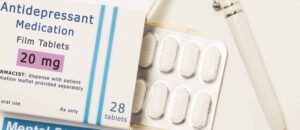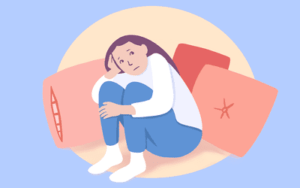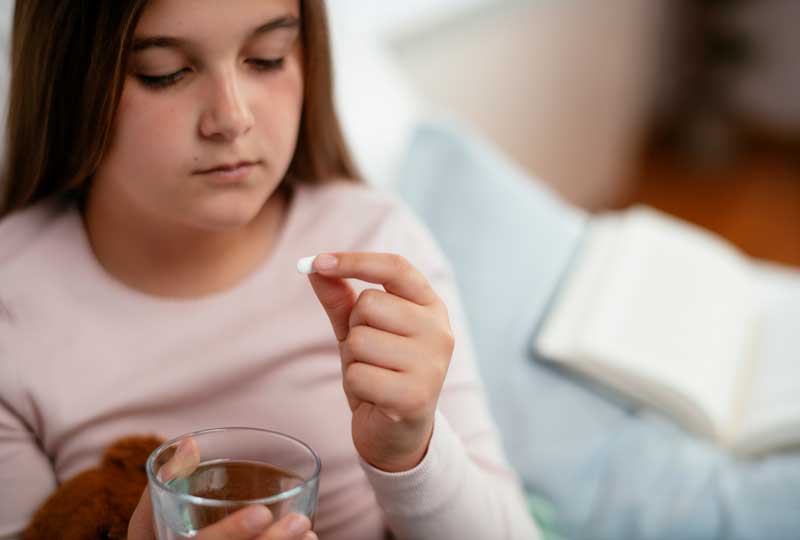If you are the parent of a teenager, there is a good chance that you have been asked about antidepressants. It can be difficult to know what to do when your child is struggling with mental health issues, and it can be hard to know whether or not antidepressants are the right solution. In this blog post, we will discuss everything you need to know about antidepressants for teens. We will cover what they are, how they work, and who should consider taking them. We will also talk about the potential risks and side effects of antidepressant medications.
Contents
What Are Antidepressants?
 Antidepressants are medications used to treat clinical depression or prevent it from recurring. They can also be used to treat other conditions, such as anxiety disorders, eating disorders, and obsessive-compulsive disorder (OCD).
Antidepressants are medications used to treat clinical depression or prevent it from recurring. They can also be used to treat other conditions, such as anxiety disorders, eating disorders, and obsessive-compulsive disorder (OCD).
Antidepressants work by correcting the chemical imbalance in the brain that is thought to be the cause of clinical depression. These are drugs that are primarily used for treating depression. It is believed that depression is caused by an imbalance of neurotransmitters, which are the chemicals that send signals between nerve cells in the brain.
There are different types of antidepressants, and each one works a little differently. When you are choosing antidepressants for teens, you have to consider how well they work, what side effects they may cause, and whether the teen can comply with the treatment.
What Antidepressants To Use For Teens?
There are various types of antidepressants available, so it’s important to work with a healthcare professional to determine which one may be best for your teen. Some of the most common antidepressants used to treat depression in teens include:
Selective serotonin reuptake inhibitors (SSRIs)
This is the most commonly prescribed type of antidepressant. SSRIs help increase levels of serotonin in the brain, which can improve mood. Examples of SSRIs used to treat depression in teens include:
- Fluoxetine (Prozac)
- Sertraline (Zoloft)
- Paroxetine (Paxil, Pexeva)
- Fluvoxamine (Luvox)
- Escitalopram (Lexapro)
- Citalopram (Celexa)
These are some examples of SSRIs that are commonly used to treat depression in teens. If your teen is prescribed an SSRI, it’s important to closely monitor their symptoms and side effects.
Serotonin-norepinephrine reuptake inhibitors (SNRIs)
SNRIs are another type of antidepressant that can be used to treat depression in teens. This drug works by preventing the reuptake of serotonin and norepinephrine in the brain, which helps to improve mood and relieve symptoms of depression. These medications are believed to be just as effective as SSRIs, but they may have a slightly higher risk of side effects.
Some common SNRIs that are used to treat depression in teens include:
- Effexor (venlafaxine)
- Cymbalta (duloxetine)
- Pristiq (desvenlafaxine)
- Fetzima (levomilnacipran)
These medications are basically approved for teens for the treatment of depression, OCD, and bipolar disorder.
Moreover, if you are considering taking antidepressants for your teen, it’s important to talk to their doctor about the potential risks and benefits.
What Are The Side Effects Of Antidepressants?
 There are a variety of side effects that can occur when taking antidepressants. The most common side effects are:
There are a variety of side effects that can occur when taking antidepressants. The most common side effects are:
- Nausea
- Vomiting
- Diarrhea
- Constipation
- Loss of appetite
- Weight loss or gain
- Fatigue
- Drowsiness
- Trouble sleeping or insomnia
- Agitation or restlessness
- Anxiety
- Blurred vision
- Dry mouth
- Headache
- Increased sweating
Some of the less common side effects include:
- Abnormal bleeding or bruising
- Allergic reactions (rash, hives, itching, swelling of the face, mouth, or throat)
- Confusion
- Elevated blood pressure
- Fever
- Frequent urination or difficulty urinating
- Hallucinations (seeing things that are not there)
- Hearing voices that do not exist
- Impulsiveness
- Irritability
- Mania
- Memory problems
- Seizures
- Severe headache or migraine
- Suicidal thoughts or behaviors
- Trembling or shaking
So the side effects can actually be pretty serious. If you are experiencing any of these, it’s important to talk to your doctor right away.
Moreover, you should also be aware that some of these side effects may persist even after you stop taking the medication. So it’s important to work closely with your doctor to monitor your symptoms and make sure they are not getting worse.
When To Consider Antidepressants For Teens?
Medication is usually only considered for children and adolescents with moderate to severe depression that has not responded to other treatment options. If your teen is experiencing any of the following symptoms, it may be time to seek professional help:
- Problems at school or declining grades
- Increased conflict with friends or family members
- Loss of interest in favorite activities
- Withdrawing from friends or social activities
- Loss of interest in eating or sleeping
- Increased irritability or angry outbursts
- Persistent thoughts of death or suicide
If your teen is displaying any of these symptoms, don’t hesitate to reach out to a mental health professional for help. While medication may not be right for every teen, it can be an effective treatment option for many.
If you’re considering antidepressants for your teen, it’s important to talk to a mental health professional about all of the potential risks and benefits. Medication is not without its risks, and it’s important to weigh those against the potential benefits.
Even, in some cases, the decision to start medication may not be up to you. If your teen is experiencing severe symptoms, they may need to be hospitalized. In a hospital setting, your teen will be closely monitored and can receive the intensive treatment they need.
What Things To Consider Before Taking Antidepressants?
 When you are considering taking antidepressants, it is important to think about a few things first. Here are some things to keep in mind:
When you are considering taking antidepressants, it is important to think about a few things first. Here are some things to keep in mind:
- Your age
- The severity of your depression
- Your family history of mental illness
- Any other medical conditions you have
- What medications you are currently taking
- Allergies you have
- Your pregnancy status
These are just a few examples, but it is important to talk to your doctor about any and all concerns you have before starting on antidepressants. Your doctor will also want to rule out any other potential causes of your depression, such as a medical condition or a reaction to a medication you are taking.
According to studies, people of all ages can experience depression. However, it is most common in adults aged 18-25 and women are more likely to experience depression than men. But with teens, it is becoming more and more common. In fact, studies show that about 20% of all teens will experience depression at some point during their teenage years.
Therefore, you are not alone if you are considering taking antidepressants as a teenager. If you have any questions or concerns, be sure to talk to your doctor. They will be able to help you make the best decision for your individual situation.
Are There Any Alternative Treatment Options?
As there may be chances of developing some kind of dependency on antidepressants, it is important to consider other options as well. If your teenager has mild depression, cognitive behavioral therapy may be an option. Some of the alternative options are:
Cognitive Behavioral Therapy
CBT is a type of psychotherapy that helps a person change their thinking and behavior. It has been found to be effective in treating depression. CBT works by helping the person identify and change their negative thoughts and behaviors. In fact, this is one of the most common types of therapy used to treat depression.
Interpersonal Therapy
Interpersonal therapy is a type of short-term therapy that is focused on helping people improve their relationships. This can be helpful for teens who are struggling with depression because it can teach them how to better communicate and relate to others. It is also known as talk therapy or psychotherapy. More often, interpersonal therapy is used in conjunction with medication.
Dietary Changes
A healthy diet is essential for maintaining proper mental health. Certain foods have been shown to improve mood and reduce anxiety. These include:
- Omega-three fatty acids
- Magnesium
- Probiotics
- Dark chocolate
Adding these items to your diet may help reduce the symptoms of depression. In fact, dietary changes are very effective for some people. Because healthy eating habits are essential for overall health, it’s important to make these changes even if you’re not experiencing depression.
More often, when your teen is struggling with depression, they may not have an appetite at all. This can be a challenge, but it’s important to make sure they’re getting the nutrients they need. A dietitian or nutritionist can help you develop a plan to make sure your teen is getting the right nutrients.
Healthy coping mechanisms
This is one of the most important things you can do for your teen. Some healthy coping mechanisms include:
- Exercise
- Journaling
- Talking to a trusted friend or family member
Exercises are a great way to help your teen cope with stress and anxiety. They can also help improve their mood. There are many different types of exercises, so find one that your teen enjoys and stick with it.
Journaling is another great way to help your teen cope with stress and anxiety. It can also help them to process their thoughts and feelings. Find a journal that your teen likes and encourage them to write in it every day. And yes talking to someone will help your teen to feel better and hopefully avoid future anxiety or depression.
Support groups
There are many support groups available for teens with depression. These groups can provide a safe place to talk about your experiences and feelings. They can also offer practical advice and tips on how to cope with depression.
Support groups are usually led by a mental health professional, such as a therapist, psychologist, or psychiatrist. However, some groups are peer-led. These groups can be a great way to connect with other teens who are going through similar experiences.
Sharing your emotions can help you feel less alone and can provide support and understanding. You can find a list of support groups in your area by searching online or contacting your local mental health center.
These are just a few of the many resources available to help teens with depression. If you or someone you know is struggling with depression, there are people who can help. Talk to your doctor or a mental health professional about treatment options. You don’t have to go through this alone.
Conclusion
To conclude, antidepressants for teens are a highly controversial topic. Some people believe that they are helpful and can be a lifesaver for some teens, while others believe that the risks outweigh the benefits. It is important to do your research and talk to your doctor before making any decisions about whether or not antidepressants are right for you or your child.
Moreover, it’s essential to keep in mind that antidepressants are not a “cure-all” and they come with their own set of risks and side effects. If you or your child is considering taking antidepressants, be sure to talk to your doctor about all the possible risks and benefits.
For more information, please contact MantraCare. Depression is a mental illness characterized by persistent feelings of sadness, hopelessness, and loss of interest in daily activities. If you have any queries regarding Online Depression Counseling experienced therapists at MantraCare can help: Book a trial Depression Therapy session


